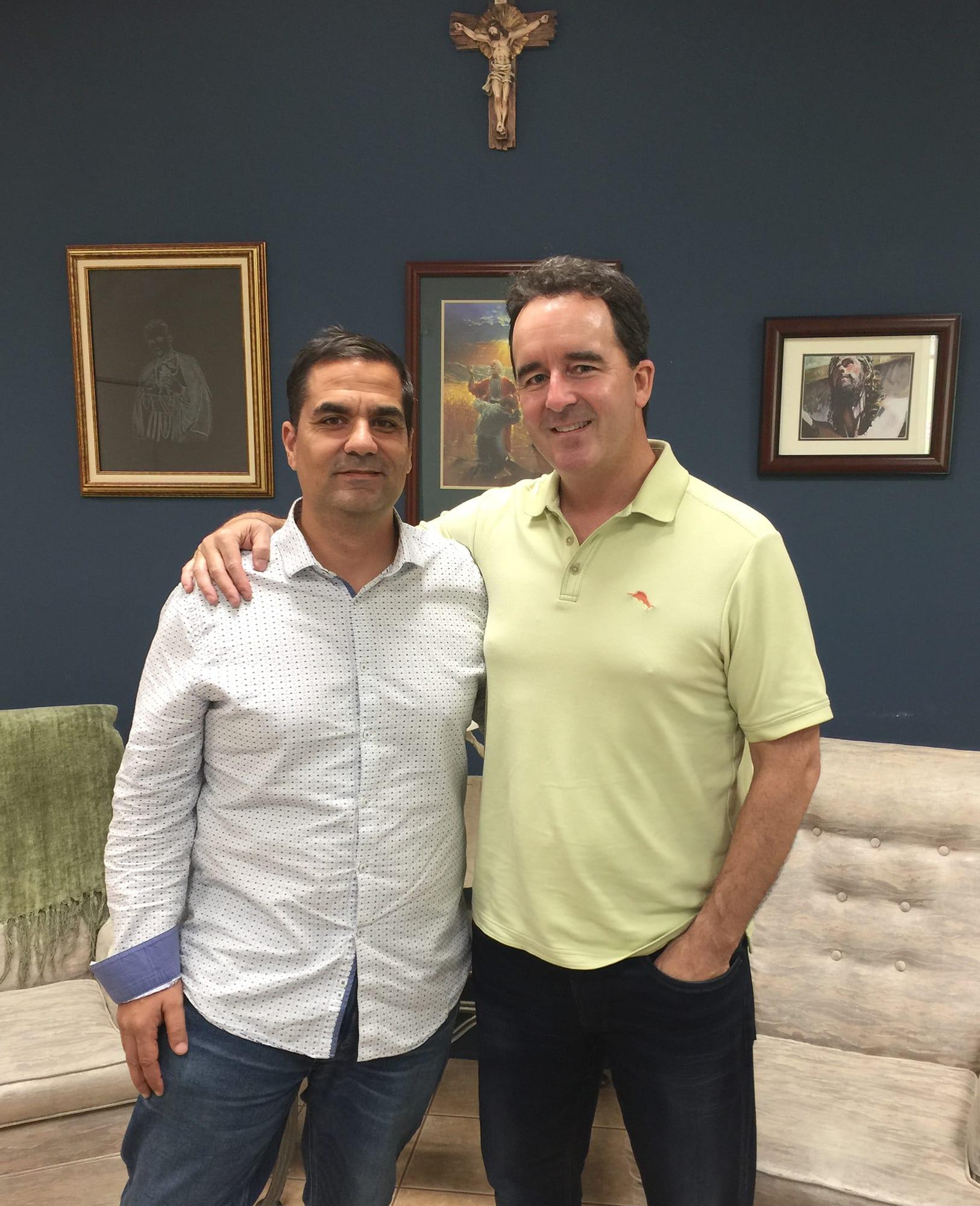MIAMI — After a routine exam 16 years ago, Dr. Shawn Fibkins discovered that he had inherited polycystic kidney disease from his father.
“It was devastating for me because now I was in the medical field and I knew what that disease meant for people: trips to the hospital with ruptured brain aneurysms and kidney failure,” he said.
That same year, the radiologist was encouraged by his wife to attend an Emmaus retreat at St. John Neumann parish in Miami where he found not only spiritual help, but future physical help from retreat participant, John Fernandez.
While the two men were talking, Fibkins told Fernandez about his incurable kidney disease and fears of leaving his twin boys fatherless. When he said his kidneys would eventually fail, Fernandez casually replied, “If you ever need a kidney, let me know man, I got you.”
A few months later, Fibkins was diagnosed with an aneurysm and traveled to the University of Massachusetts for a procedure to prevent a rupture. His community of Emmaus “brothers” rallied to support him, including two men who came to pray with him in the hospital.
Fibkins surrendered himself to God, mindful that his father had died of this same kidney disease at the age of 35.
“As a Christian we are always asked to give everything up to God and put him in the driver’s seat and let the Lord guide us. And I didn’t really know what that meant until I went through the aneurysm scare,” he recalled. “I chose that path and said if this is my time to go then take me and I was OK with dying, actually. That kind of brought me a peace.”
But the doctor discovered he hadn’t actually had an aneurysm. “If I had gone somewhere else, he said that they would have tried to treat it and (I) would’ve had a really bad outcome. So, I was definitely in the right place. I feel God kind of pushed me along there and things kind of aligned,” Fibkins, now 47, told the Florida Catholic, archdiocesan newspaper of Miami.
Fernandez, now 44, said he felt a call from God to leave the corporate sector to become director of religious education at St. John Neumann. Fibkins became godfather to Fernandez’s first child, Priscilla, and moved to Parkland to start his practice, but the friends remained close.
Then, in 2017, Fibkins’s kidney function heavily deteriorated. He gained 50 pounds and was sick every day. “You feel like your body is just poisoned,” he said, adding that even for those on dialysis, “you still feel terrible.”
He registered at Jackson’s Miami Transplant Institute. Family members and colleagues volunteered to donate a kidney but didn’t qualify as matches. Always “ridiculously healthy,” Fernandez quickly volunteered and matched, telling his friend: “Don’t make a big deal about it.”
But Fernandez still had to tell his wife. “She initially said, ‘You can’t do that, what about the girls, what about me?’ But mid-sentence then she said, ‘If you needed it, I would hope somebody would do it.'”
That yes meant everything to Fibkins. “It is hard to describe what it is like to have a friend willing to lay down a piece of his life so that yours may continue.”
Within a month, on Aug. 30, 2018, both checked into the hospital. “It was one of those rubber meets the road moments,” recalled Fernandez. “No greater love says the Lord than to give your life for a friend. But are you willing? It’s very easy to teach it, to read it, to proclaim it, but do I have the guts to do this?”
It also was the quintessential example for his daughters, he said.
Fibkins also prepared for the procedure with faith in its outcome.
After a seven-hour surgery, Fibkins said his friend gave him a whole new life. “I feel like I’m cured. I walk around, I’m healthy. I do everything I was doing before I got sick. It’s like a miracle.”
And he was able to give back to his friend sooner than expected, when Fernandez’s parents both died within the next few months.
“Shawn called daily, he came down a few times,” Fernandez said. “Having this kind of support was what got me through two very rough months.”
Following their surgeries, Fernandez was back to work in a week and Fibkins in three months, neither with complications. The radiologist takes four daily doses of medicine, but he now feels closer to his family, inhales life more deeply, and empathizes more profoundly with patients facing kidney failure and chemotherapy.
Fibkins, a member of Mary Help of Christians Parish in Parkland, also feels inspired to speak on the safety of kidney donation in gratitude for Fernandez.
“I drag John through this because I feel if we save one life it’s worth his grumbling,” he said.
“There are so many people that need it. Lives can be saved. And that’s a very Christian act, to give part of yourself.”
– – –
Greear writes for the Florida Catholic, archdiocesan newspaper of Miami.
Crux is dedicated to smart, wired and independent reporting on the Vatican and worldwide Catholic Church. That kind of reporting doesn’t come cheap, and we need your support. You can help Crux by giving a small amount monthly, or with a onetime gift. Please remember, Crux is a for-profit organization, so contributions are not tax-deductible.











